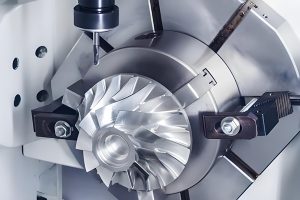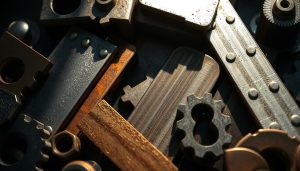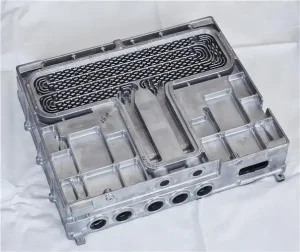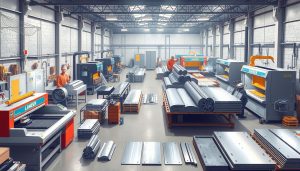In the ever-evolving world of modern manufacturing, computer numerical control (CNC) machining has emerged as a game-changing technology that is revolutionizing the way we produce a wide range of products, from aerospace components to medical devices. This comprehensive guide will delve into the intricacies of CNC machining, exploring its fundamental principles, its diverse applications across various industries, and how it is transforming the landscape of automated manufacturing.
CNC machining is an advanced manufacturing process that utilizes computerized controls to operate machine tools, such as lathes, mills, and grinders, with remarkable precision and efficiency. Unlike traditional manual machining methods, CNC machines follow pre-programmed instructions, known as G-code, to execute complex manufacturing tasks with unparalleled accuracy and repeatability. This innovative approach to production has paved the way for a new era of computer-controlled automated manufacturing, enabling manufacturers to create intricate parts and components with unprecedented levels of precision and consistency.
How CNC Machining Works
At the heart of computer-aided design (CAD) and automated production lies the intricate process of CNC machining. This advanced manufacturing technology is transforming the way we design and fabricate a wide range of products, from aerospace components to consumer electronics.
The Basics of CNC Technology
CNC, or Computer Numerical Control, is a automation process that utilizes pre-programmed software to control the movement and operation of machine tools. These machines are capable of precisely cutting, shaping, and drilling a variety of materials, such as metals, plastics, and composites, to create complex, customized parts with unparalleled accuracy.
Converting CAD Designs into G-code
The journey from a computer-aided design (CAD) model to a physical part begins with the conversion of the digital blueprint into a set of machine instructions known as G-code. This numerical control programming language is the language that CNC machines understand, directing the precise movements of the cutting tools to bring the design to life.
The Role of CNC Machines in Manufacturing
CNC machines have become an integral part of modern manufacturing, enabling the automated production of a wide range of components with consistent quality and efficiency. By seamlessly integrating computer-aided design, G-code programming, and automated production processes, CNC machining has revolutionized the way we approach complex manufacturing challenges, driving innovation and boosting productivity across various industries.
“CNC machining is the backbone of modern manufacturing, enabling us to push the boundaries of what’s possible in product design and development.”
Types of CNC Machines
The world of CNC (Computer Numerical Control) machining offers a diverse array of specialized machines, each designed to tackle specific manufacturing needs. From basic 3-axis milling machines to advanced multi-axis lathes, the choice of CNC equipment can significantly impact the quality, efficiency, and complexity of the final product.
3-Axis CNC Machines
The most fundamental type of CNC machine is the 3-axis model, which provides movement along the X, Y, and Z axes. These versatile milling machines excel at producing a wide range of parts and components, from simple to moderately complex designs. With their reliable performance and user-friendly operation, 3-axis CNC machines remain a staple in many manufacturing facilities.
4-Axis and 5-Axis CNC Machines
For more intricate parts and products, 4-axis and 5-axis CNC machines offer increased capabilities. These advanced systems can rotate and tilt the workpiece, allowing for the creation of complex geometries and increased accessibility to hard-to-reach areas. This enhanced flexibility makes 4-axis and 5-axis CNC machines invaluable for producing high-precision components, such as those found in the aerospace, medical, and automotive industries.
Multi-Axis CNC Machines: Benefits and Applications
The integration of multiple axes in CNC machining unlocks a world of possibilities. Multi-axis CNC machines, including 5-axis and 6-axis models, enable the seamless production of intricate parts with exceptional accuracy and efficiency. These advanced systems excel at tasks such as milling, turning, and multi-axis machining, making them ideal for manufacturing complex products across a wide range of industries, from aerospace to consumer electronics.
| CNC Machine Type | Axes | Key Benefits | Common Applications |
|---|---|---|---|
| 3-Axis CNC Machines | X, Y, Z | Versatile, user-friendly, cost-effective | General manufacturing, prototyping, small-to-medium parts |
| 4-Axis and 5-Axis CNC Machines | X, Y, Z, A, B | Enhanced flexibility, increased precision, complex geometries | Aerospace, medical devices, automotive, high-precision components |
| Multi-Axis CNC Machines | 5-Axis, 6-Axis | Exceptional accuracy, efficiency, versatility | Aerospace, medical, consumer electronics, complex manufacturing |
Materials Used in CNC Machining
When it comes to CNC machining, the choice of material is crucial in determining the final product’s performance, durability, and cost-effectiveness. From metals to plastics and composites, the world of CNC machining offers a wide range of material options to suit various manufacturing needs.
Metals in CNC Machining
Metals are the most common materials used in CNC machining, offering exceptional strength, rigidity, and precision. Aluminum is a popular choice for its lightweight yet durable properties, making it ideal for applications such as aerospace components and consumer electronics. Titanium parts, on the other hand, are prized for their high strength-to-weight ratio and corrosion resistance, often used in medical devices and aircraft parts.
Plastics and Composites for CNC
Plastic prototyping is another area where CNC machining excels, with the ability to produce intricate and complex parts from a variety of thermoplastic and thermoset materials. These materials offer design flexibility, low cost, and quick turnaround times, making them suitable for a wide range of industries, including consumer goods and electronics.
Choosing the Right Material for CNC Manufacturing
Selecting the appropriate material for CNC machining requires a careful consideration of factors such as the part’s intended use, production volume, and cost constraints. By working closely with experienced CNC machining providers, manufacturers can ensure they choose the optimal material that delivers the desired performance characteristics while maximizing cost-efficiency and production speed.
“The right material selection is crucial in CNC machining, as it directly impacts the final product’s quality, durability, and cost-effectiveness.”

Key Advantages of CNC Machining
CNC (Computer Numerical Control) machining has revolutionized the manufacturing industry, offering a multitude of advantages that make it an indispensable tool for precise manufacturing, rapid prototyping, and custom parts production. Let’s explore the key benefits of this cutting-edge technology.
High Precision and Accuracy
One of the primary advantages of CNC machining is its ability to produce parts with exceptional precision and accuracy. The computer-controlled nature of the machines ensures that every cut, drill, and movement is executed with meticulous attention to detail, resulting in components that meet the tightest of specifications. This level of precision is crucial in industries such as aerospace, medical devices, and high-performance automotive manufacturing.
Increased Efficiency and Production Speed
CNC machining significantly boosts manufacturing efficiency and production speed. The automated nature of the process allows for faster material removal, reduced setup times, and continuous operation, leading to increased output and reduced lead times. This efficiency translates to cost savings and the ability to meet tight deadlines, making CNC machining an attractive option for businesses seeking to optimize their production processes.
Flexibility and Customization
CNC machining offers unparalleled flexibility and customization capabilities. The programming of the machines can be easily modified to accommodate design changes, allowing for quick adjustments and the production of custom parts without the need for extensive retooling. This flexibility is invaluable in industries where product variations and rapid prototyping are essential, such as consumer electronics and medical device manufacturing.
In conclusion, the precise manufacturing, rapid prototyping, and custom parts production capabilities of CNC machining make it a game-changer in the modern manufacturing landscape. By leveraging these key advantages, businesses can enhance their competitive edge, improve product quality, and meet the evolving demands of their customers.

Common Applications of CNC Machining
CNC machining has become an indispensable tool in various industries, revolutionizing the way complex parts and components are manufactured. From the intricate aerospace components that power our aircraft to the meticulously crafted automotive parts that keep our vehicles running, CNC technology has firmly established its presence across diverse sectors.
Aerospace Industry
The aerospace industry relies heavily on CNC machining to produce critical components with unparalleled precision and reliability. CNC-machined parts are found in everything from aircraft engines and landing gear to satellite components and rocket propulsion systems. The aerospace industry’s demand for high-quality, low-weight, and durable parts makes CNC machining an essential manufacturing process.
Automotive Manufacturing
The automotive industry has embraced CNC machining as a key enabler of innovation and efficiency. CNC-machined automotive parts such as engine blocks, transmission components, and suspension systems demonstrate the technology’s ability to deliver intricate designs and superior performance. Automakers rely on CNC machining to keep up with the industry’s ever-evolving demands for more sophisticated and customized parts.
Medical Devices and Prototyping
The medical industry has witnessed a profound impact from CNC machining, particularly in the production of medical implants and the rapid prototyping of innovative devices. CNC-machined medical components, from orthopedic implants to surgical tools, must meet the highest standards of precision and biocompatibility. The flexibility and accuracy of CNC machining have made it a crucial enabler of medical innovation and patient care.
Consumer Goods and Electronics
CNC machining also plays a vital role in the manufacturing of consumer goods and electronic devices. From precision-engineered casings and enclosures to intricate components used in consumer electronics, CNC technology ensures the consistent production of high-quality parts that meet the demands of modern consumers.
The versatility and precision of CNC machining have made it an indispensable tool across a wide range of industries, from aerospace components and automotive parts to medical implants and consumer electronics. As technology continues to evolve, the applications of CNC machining will only continue to grow, solidifying its position as a key driver of innovation and manufacturing excellence.
Challenges and Considerations in CNC Machining
While CNC machining offers numerous advantages in manufacturing, it also presents some unique challenges that must be addressed. One of the primary concerns is the high initial equipment costs associated with purchasing and maintaining CNC machines. These specialized machines require significant capital investment, which can be a significant barrier for small businesses or startups.
In addition to the financial considerations, operator training is a crucial factor in successful CNC machining. Operators must possess a thorough understanding of the technology, programming, and machine operation to ensure accurate and efficient production. Proper training is essential to minimize errors, reduce waste, and maintain quality standards.
Lastly, the importance of preventive maintenance cannot be overstated. CNC machines are complex and delicate pieces of equipment that require regular upkeep and servicing to maintain optimal performance. Neglecting maintenance can lead to increased downtime, part defects, and reduced productivity, ultimately affecting the overall cost-effectiveness of the CNC machining process.
Addressing the Challenges
To mitigate these challenges, businesses must carefully evaluate their CNC machine investment, prioritize operator training, and implement a robust preventive maintenance program. By addressing these key considerations, manufacturers can unlock the full potential of CNC machining and ensure a successful and cost-effective production process.
| Challenge | Considerations |
|---|---|
| High Initial Equipment Costs | Carefully evaluate the long-term benefits of CNC machine investment, explore financing options, and factor in maintenance and operational costs. |
| Skill Requirements for Operation | Invest in comprehensive operator training programs, hire experienced CNC machinists, and provide ongoing skill development opportunities. |
| Maintenance and Downtime | Implement a preventive maintenance schedule, utilize predictive maintenance technologies, and have a plan in place to minimize downtime and ensure optimal machine performance. |
By addressing these challenges and considerations, manufacturers can unlock the full potential of CNC machining and ensure a successful and cost-effective production process.
Why Choose Shixinproto for CNC Machining Services?
When it comes to precision CNC machining, Shixinproto stands out as a trusted industry leader. With their team of skilled engineers and state-of-the-art CNC machines, they consistently deliver high-quality, custom machining solutions that meet even the most demanding specifications.
Expertise in High-Precision CNC Machining
Shixinproto’s decades of experience in the field of CNC machining have equipped them with the expertise to handle complex parts and intricate designs with unparalleled precision. Their commitment to quality and attention to detail ensures that every project they undertake meets the highest industry standards.
State-of-the-Art CNC Machines for Complex Parts
Shixinproto’s state-of-the-art CNC machines are capable of producing complex parts with exceptional accuracy and efficiency. Whether you require complex geometries, tight tolerances, or unique material processing, their advanced technology and skilled operators are up to the task.
Fast Turnaround Times and Customized Solutions
At Shixinproto, they understand the importance of quick turnaround times and tailored solutions to meet the specific needs of their clients. Their streamlined processes and commitment to customer satisfaction ensure that your projects are delivered on time and within budget, without compromising the quality of the final product.
Learn More About Shixinproto’s CNC Machining Services
To discover how Shixinproto’s precision CNC services, custom machining solutions, and rapid prototyping capabilities can benefit your business, visit their website or contact their team today. They are dedicated to providing the highest level of service and exceeding your expectations.





